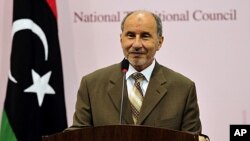U.S. Secretary of State Hillary Clinton and officials from about 50 other countries are set to convene in Paris on Thursday to discuss Libya’s transition to post-Gadhafi democratic rule. The head of Libya’s National Transitional Council, Mustafa Abdel Jalil, is expected to outline the NTC’s immediate needs.
France called the meeting a week ago as NTC forces moved into Tripoli. Now, with Moammar Gadhafi's rule at an end, the conference will focus on how to help Libya establish stable democratic governance.
The list of participants for the “Friends of Libya” conference has grown significantly in recent days to include key countries like Russia and China, which have not recognized the NTC as Libya’s new governing authority.
Secretary of State Clinton, who has interrupted her summer vacation to attend, says the weeks ahead will be “critical” for Libya and that the world community needs to act “decisively” to help the NTC. But she says the transition must be Libyan-led.
State Department Spokeswoman Victoria Nuland says NTC chief Jalil’s presentation at the meeting will be pivotal.
“One of the things that we expect to hear at this meeting is a report from the Transitional National Council on how it sees moving forward, what it wants for the international community -- including how it wants to work with the [U.N.] Security Council on the appropriate unwinding of [U.N. resolutions] 1970 and 1973," Nuland said.
Those United Nations resolutions imposed sanctions against Moammar Gadhafi's government and authorized the NATO-led air campaign that helped oust the longtime ruler.
The United States and other countries have begun the process of releasing frozen Libyan assets through the U.N. Sanctions Committee.
But some leading members of the U.S. Congress want Secretary Clinton to withhold the money unless the NTC agrees to give up Abdel Baset al-Megrahi, the Libyan convicted in the 1988 bombing of a U.S. PanAm jetliner over Scotland.
The NTC has told the United States it will revisit the case against Megrahi, who was returned to Libya from Scotland in 2009 on humanitarian grounds and is reported in grave condition in Tripoli with cancer.
Nuland says the NTC has more urgent priorities than the Megrahi case. “We need to give the TNC a chance to do job one, which is to finish the job of ousting Gadhafi and his regime, begin the job of establishing Libya on a democratic path. And we are very gratified by the fact that they have made clear they are willing to look into this,” she said.
A key issue in Paris will be the question of a peacekeeping presence in Libya.
Ian Martin, special advisor to U.N. Secretary-General Ban Ki-moon on post-conflict planning, says the National Transitional Council's interest is in foreign advice, not troops. “In our discussions with the NTC, it is very clear that the Libyans want to avoid any military deployment by the U.N. or others. They are very seriously interested in assistance with policing to get the public security situation under control and gradually develop a democratically accountable public security force,” Martin said.
Human rights groups say the Paris conferees must press the NTC to avoid reprisals against Gadhafi loyalists, while seeking accountability for serious human rights violations during the Gadhafi era.
Sarah Leah Whitson, Middle East and North Africa Director at Human Rights Watch, says major responsibilities come with political recognition of the NTC. “Number one among them is going to be avoiding retribution and reprisal killings against Gadhafi forces or against alleged or feared Gadhafi supporters. Because certainly, as you can imagine, there is a lot of anger and rage that’s built up over the past several months and over the past 40 years," Whitson said.
Whitson says the former Libyan leader and his key associates, who face international war crimes charges and are still at large, must be treated with due process in accordance with international law.
Libya Support Group to Convene in Paris




